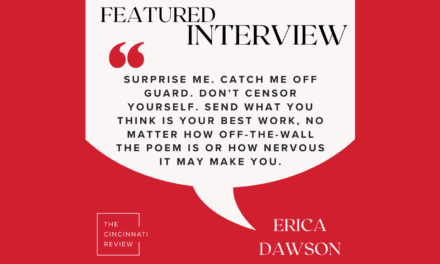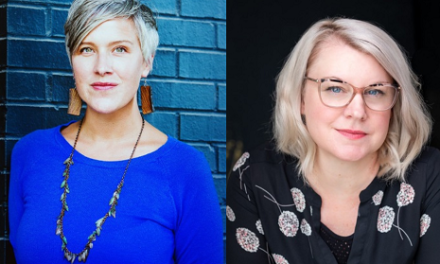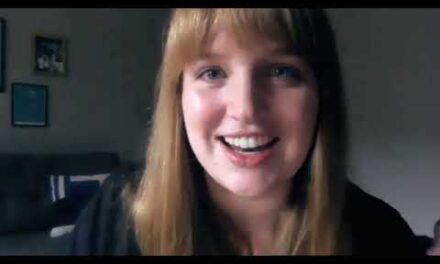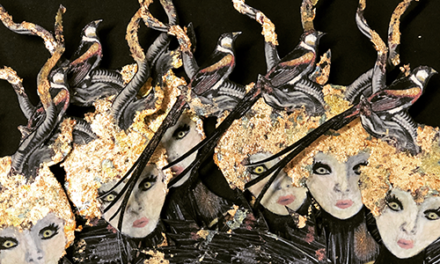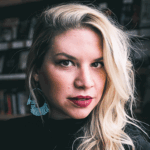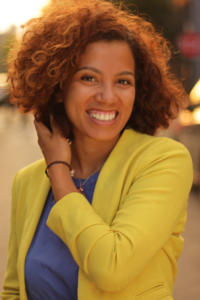
Assistant Editor Sakinah Hofler: In Tanya Everett’s A Dead Black Man (excerpts of which appear in our Issue 17.1, due out to subscribers in the next week or so), Everett gives voice to the idea of the dead Black man, making him an essential character in the play. In her note, she states that this play is “a call to action and my love note to Black men” and, I would add, the unsilencing of Black men, which makes society’s collective idea of “a Black man” more nuanced. The Dead Black Man has a voice, The Dead Black Man engages with other characters, The Dead Black Man explains. Everett uses scenes as vehicles to explore desires, vulnerabilities, brokenness, the desire for understanding, peace, and violence. One of the characters, after admitting she saw someone get shot, questions, “What does it mean: to be caught in someone else’s fury?” This question, and others, arise and are deftly explored throughout the play. Thoroughly impressed and moved by Everett’s work, I’m grateful I had the opportunity to interview her in late May for The Cincinnati Review:
In your Author’s Note, you write: “I want to imagine Black men in all of their many hues. . . . I want to remember that the lives of Black men are layered, sweet, funny, and complex.” Can you describe your initial inspiration to write this play?
I felt the weight of Black men—their eyes, asking me to investigate their story, and to humanize their experience. I have long been at a loss with how the world treats my brothers. I am overwhelmed and hurt by it, daily. This play began as an exploration and has transformed into my love letter to them. Day by day, and nothing seems to change. It’s heartbreaking to continue to have names to add to the list of the destruction of Black men (and women), and I am interested in unraveling that narrative. As a community, Black folks are worn out from grieving, and we need to feel seen, heard, and held. And Black men need to see themselves supported, loved, fed, nourished. There is a need to paint them on a full canvas. I love Kehinde Wiley’s work, because he does just that—lifts up seemingly “ordinary” Black men and women to extraordinary heights.
Can you describe your process for creation? Was it something you envisioned from start to finish? Did your material change as current events unfolded? Did you get input on initial drafts, and if so, how did it affect the final version?
I am constantly in process with all of my work. Is anything ever finished? As an emerging writer, there is so much to consider and grapple with and collaboratively solve. I lean on my actors, directors, designers, and dramaturgs heavily.
The seed of the play began as a seven-minute play for NY Madness, a theater company of which I am a member. I offered this short piece as an exploration of the theme “Fascism.” I’m sure I looked up the definition at the time and tried to pick it apart: “a political philosophy, movement, or regime (such as that of the Fascisti) that exalts nation and often race above the individual and that stands for a centralized autocratic government headed by a dictatorial leader, severe economic and social regimentation, and forcible suppression of opposition.” I was interested in how to be Black in America is to participate in a type of fascism—we seem to be operating in different political systems, along lines of race.
As for my process, it’s still developing. I am curious about how this will impact an audience, so I think the latest version is directly invested in the audience participation element. I have been working in collaboration and presented this in development readings in New York. Shows like Diana Oh’s {my lingerie play} and Aleshea Harris’s What to Send Up When It Goes Down are direct influences, of course. I have received some critical feedback, after my fellowship reading with Playwrights Realm in February and will be working on it more extensively in the coming months.
Throughout the excerpts, The Dead Black Man acts as Deshawn’s shadow, at different points huddling with him and speaking to the audience. Initially I thought he would be a silent character, and I found it joyful and surprising when he spoke. Can you speak more about your choices to have him move and speak as he does? Are there are other ways he moves in the full-length play?
The Dead Black Man is our omniscient narrator. We experience the play through his guidance. I also wanted to make sure that we heard his point of view—and that he gets to express his joy and pain. The actor playing this role has to take on such a difficult journey; it’s important that he also gets to share his heart through his voice. The play creates more and more agency for him. He is not only acted upon—he demonstrates his voice, his power, his will, on the world around him. He is uplifted, and exalted. Moment by moment, he grows himself and his power. This play, for me, is a journey from the depth of darkness to overwhelming light. And The Dead Black Man softens, expands, crystallizes, and shines.
Do you think plays can influence social change? Are there plays that have influenced your work? Feel free to include movies, books, poems, etc.
I believe that social change can be influenced by art, and especially plays. But plays aren’t enough. We go to the theatre for all kinds of reasons, and I believe that the act of creating and witnessing art is powerful, but we also need to take this work into our communities, our churches, our homes. So while I believe in the power of art, I believe that social activism is a lifelong, full-body commitment. We have to take the art home with us, to affect real change.
I am influenced by the work of James Baldwin, Toni Morrison, Audre Lorde, bell hooks, Tony Kushner, Lynn Nottage, as well as my peers, such as Lee Edward Colston II, Dennis A. Allen II, NSangou Njikam, and Donja R. Love—to name but a few.
What’s the earliest and/or stand-out experience that made you want to write about issues that mattered to you?
I’ve always been strongly connected to art as activism, but I remember in college I went to see Jessica Blank and Erik Jensen’s The Exonerated, and it changed my point of view on the death penalty. That was a real turning point for me. I hadn’t really contemplated the challenges and biases of the justice system until that point. I’d studied things in high school, about Hammurabi’s Code—an “eye for an eye.” And I always thought that justice was giving a sentence that was similar to the harm that had been caused. But they invited me into a world I hadn’t considered. That revealed the power of theater—the power to open minds and hearts, to invite dialogue and change.
What advice do you have for young and emerging writers, particularly for those who are POC?
I was on a plane to LA, and I met a Black woman reverend, who was also an artist. She delivered this message as we touched down, something to the effect of—trust your story. Trust that you are enough. When you get a “no,” dust yourself off, and be willing to find the next “yes.” Hold fast to your convictions. Never let anyone tell you what your story is. Find a belief that is beyond what you can see. Be kind to your doubts and fears, but do not let them stop you. Seek fellowship. Seek mentorship. Seek stillness. We need you. We love you. And: the ancestors got you. So please, keep going. Don’t ever stop.
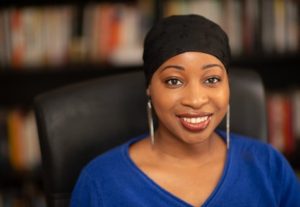
And, this might be a touchy question, so feel free not to answer, but as someone who has a lot of my family in New Jersey, and with the growing list of people I know infected (some whom have passed) as well as economic concerns, etc., I fluctuate between being fine and then being anxious. I’m very curious how other writers are coping during this time. How are you taking care of yourself during this pandemic?
Self-care is a primary concern at this time. I live in Brooklyn—it is intense, heartbreaking, and overwhelming. My grandmothers are immune compromised, and one is recovering now. It’s especially painful to confront how this situation is disproportionately affecting communities of color. My people are hurting, and that weakens the spirit. My daily practice involves meditation and prayer. I believe that there is a spiritual connection to this moment in time, and that we will have to learn about ourselves in the process. I am leaning into faith, and family, both chosen and earthly. I have a sweet fur baby, my cat Lady, and she is a huge help at this time. I give myself time every day to do nothing, so that I don’t close myself off to the magnitude of the changes. But this week I’m also taking a break from social media—the consumption of news feeds was beginning to weigh on me and block my creativity! So wish me luck!
Is there anything you’d want to add about your work?
I do all of this work in an attempt to heal myself and to heal others. I am always learning and open to dialogue. I am grateful to the magazine, staff, and community of professionals who do this work.
Tanya Everett was born in Massachusetts, raised in Brooklyn. She is a 2019–20 Playwrights Realm Fellow. Her play A Dead Black Man was a finalist for the Dramatist Guild Fellowship in 2019. And The Gods Walk Among Us was a semifinalist for the Princess Grace Award in 2019. She received her MFA from Brooklyn College.
Sakinah Hofler is a fiction writer, poet, and playwright. Her work has appeared or is forthcoming in Kenyon Review Online, Hayden’s Ferry Review, Mid-American Review, and elsewhere. Awards include the Manchester Fiction Prize, the Sherwood Anderson Fiction Award, a PEO Scholar Award. Sakinah is currently a PhD candidate and an Albert C. Yates Fellow at the University of Cincinnati.



